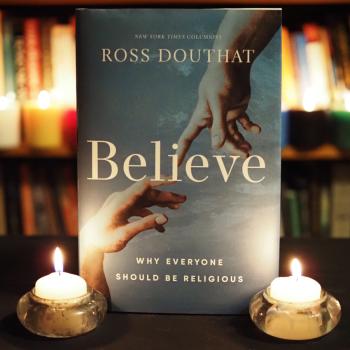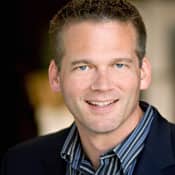And these changes are all ultimately driven by a larger question, one that I have been asking around the world for some years, and that is: "Is it possible that there is something that we don't fully understand about God and about life, the understanding of which would change everything?" And as people start to address that question, they have to say yes, of course it is possible. And that is different than it was fifty years ago. Even twenty-five years ago, there were those in those religions who would say, "No, it is simply not possible that we don't know all that we need to know about God; all we need to know is in the Scripture. Just read the book." Whether that book is the Bible, or the Quran, or the Book of Mormon, or the Bhagavad Gita, or the Upanishads ... it is all there in The Book. Only in recent times have rank-and-file members of these religions been ready to say "maybe there are some allegories in this book ... maybe they aren't meant to be taken literally true ... maybe there are some things we don't truly understand about God."
One final note: it isn't that the world's great religions are inaccurate; it is that they are incomplete. Our knowledge of God is analogous to that of children who have learned the basics of mathematics. We know that there is add-subtract-multiply-divide, and can confidently say, "we know math," and think we know all there is. In fact, of course, there is a great deal more—there is trigonometry, and higher mathematics that stretch way beyond that basic understanding. We are that way, I think, with religion. We have been sitting here for the span of a few thousand years—the blink of an eye in the history of the Universe—and have been operating on a very small sliver of information. As the years continue to go by, I think we'll find that we've been using the most preliminary of data that we've been able to gather, through intuition and other sources, about the thing we call "God," and life itself.
Over the past five years of Patheos, I've had the great fortune of meeting with leaders or teachers of many of the religious and spiritual traditions. Most of those teachers earn their living from preaching and teaching a certain set of messages. But for some of those teachers, their own personal spirituality has evolved to the degree that they no longer feel and believe the same way that they did when they started teaching. Yet they "stay on message" for the sake of the life that they have built. Do you ever find yourself falling into that trap?
No. I don't. The CWG books—and there are now nine in the series, and twenty-seven or twenty-eight books when you count the secondary materials—are very consistent, from the material I received in the mid '90s, to the latest book published in 2012. That remarkable consistency—across some 12-15,000 pages of writing—is due to the consistency of Source. If I were writing those books, and if I were reflecting my own evolutionary process over those eighteen years, one might expect at least some expansion of views, or expansion of thought. Or in talking to me privately, some would perhaps find that I had to say publicly what I said twenty years ago, but that in private that I've come to a different or larger understanding.
But in fact, that is not my experience. The writings are remarkably consistent. If I were truly one who lived the entirety of the writings—of the cosmology—of CWG, I'd be a far different person that I am now. I am very much an observer of the process. When I finish a book, it is very much like I am reading it, like I am reading books written by someone else. I recognize some of the questions; they arise out of my own very-human experience. But in the main, it is like I am reading someone else's writing. Which is in fact what is happening ... I am not writing the books, I am merely taking dictation.
The same is true of the "commentary" books. Those books contain things that I would have never come up with in a million years if I were working on my own book.
Here's another anecdote: When I was working on The Only Thing That Matters, I had no idea what it was going to be; I didn't, myself, have the answer to the question. My wife kept asking me, "Have you gotten to it yet? Do you know what it is?" and each day I would tell her "I don't know," and "I guess I will know when I get there." The book "read" itself to me on the computer screen as it was produced. Until one day I ran upstairs to my wife shouting, "Eureka! Here it is! I got it!" It just came through.
So the answer to your question is "no." I understand that and have compassion for it for those teachers. But in my case I don't fall prey to it, because, in the first instance, the information was not mine.
:::page break:::




